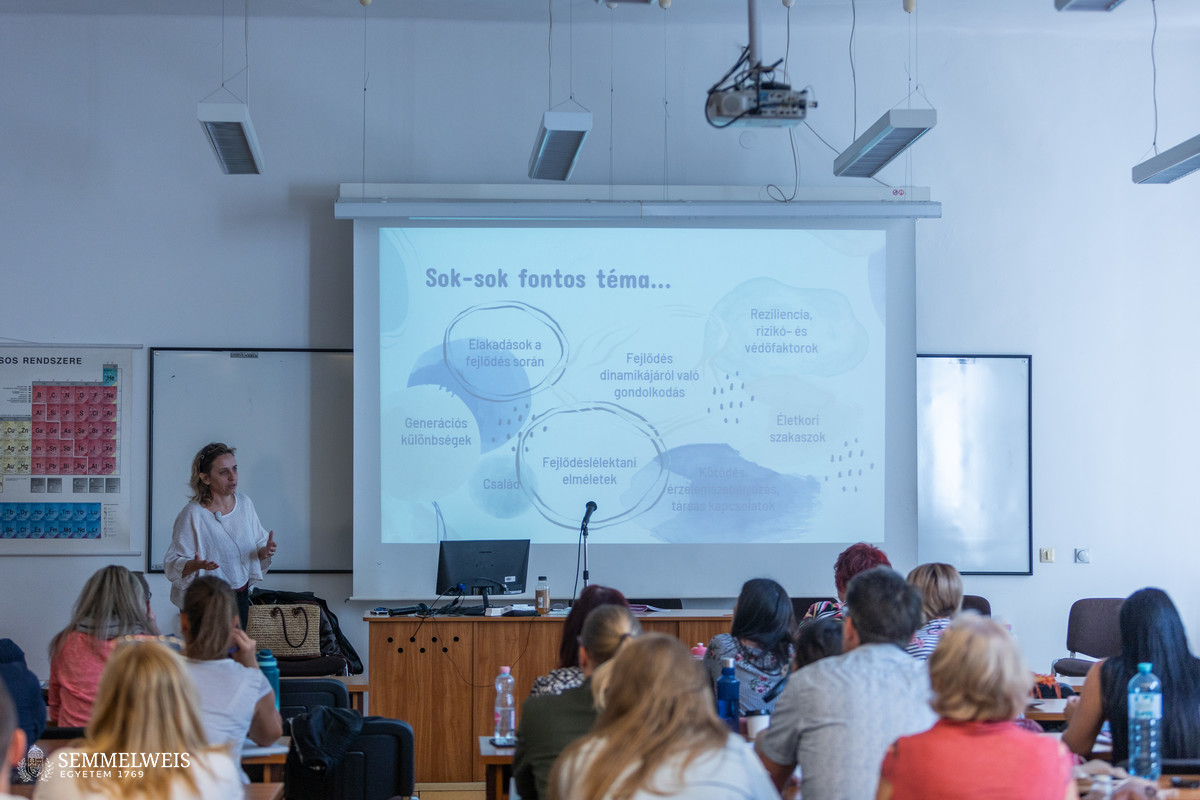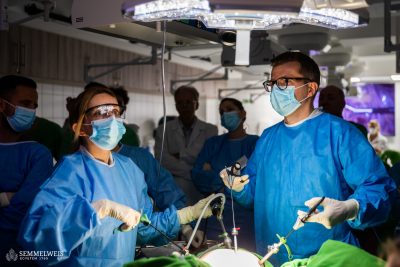Recently, in the world of work, there has been an increasing demand for managers to deal with the emotions of employees in addition to the issues of work organization and increasing efficiency, pointed out Ágnes Bolevácz, the training’s deputy specialist group leader and instructor, who has spent 25 years in a multinational environment, in both medior and senior management positions of such banks such as Raiffeisen or Erste. She started her career as an economist but as an organizational manager she increasingly moved towards the direction of human resources development.
 She is convinced that the management concept according to which employees are capable of effective work without emotional difficulties is out of date. On the contrary: “emotions, no matter where they arise, whether in the private life or in the workplace, can positively and negatively affect an individual’s mental well-being and, through this, their performance as well. The pandemic has amplified this phenomenon. Private life and work were mixed up, and the changed situation resulted in countless frustrations and difficult situations, the emotional effects of which we still encounter today. Today, managers see an increasing need to deal with the emotions of their employees. However, this requires appropriate professionals and tools,” highlighted the expert.
She is convinced that the management concept according to which employees are capable of effective work without emotional difficulties is out of date. On the contrary: “emotions, no matter where they arise, whether in the private life or in the workplace, can positively and negatively affect an individual’s mental well-being and, through this, their performance as well. The pandemic has amplified this phenomenon. Private life and work were mixed up, and the changed situation resulted in countless frustrations and difficult situations, the emotional effects of which we still encounter today. Today, managers see an increasing need to deal with the emotions of their employees. However, this requires appropriate professionals and tools,” highlighted the expert.
 “The basic idea was born as interest in our training in Mental Health was increasing, so much so that we were only able to accept a fifth of the applicants, as 550 applied for the 128 places. As a starting point, we, based on the submitted admission materials, checked what areas of interest and needs appear. We saw that basically workplace mental hygiene is the direction on which independent training could be built,” Dr. Timea Tésenyi, assistant professor at the Institute of Mental Health, head of the training group. “I started working with Ágnes Bolevácz in the summer of 2022. In the course of the creative work, we combined the organizational and management knowledge and experience she brought with the mental health approach. We laid the foundations; we both came to a common denominator regarding the concepts and developed our training plan and successfully had it approved within a year. After that, the admission process of the students could begin,” she added.
“The basic idea was born as interest in our training in Mental Health was increasing, so much so that we were only able to accept a fifth of the applicants, as 550 applied for the 128 places. As a starting point, we, based on the submitted admission materials, checked what areas of interest and needs appear. We saw that basically workplace mental hygiene is the direction on which independent training could be built,” Dr. Timea Tésenyi, assistant professor at the Institute of Mental Health, head of the training group. “I started working with Ágnes Bolevácz in the summer of 2022. In the course of the creative work, we combined the organizational and management knowledge and experience she brought with the mental health approach. We laid the foundations; we both came to a common denominator regarding the concepts and developed our training plan and successfully had it approved within a year. After that, the admission process of the students could begin,” she added.
Out of 180 applicants, they had to select the approximately 60 people whose professional profile best fits the subject of workplace mental hygiene, and who will be able to best use this in their own workplace for the development of their colleagues, especially to protect mental health, emphasized the head of the specialist group.
A significant part of the specifically practice-oriented training is professional self-knowledge, since the workplace mental health professional primarily works with their own personality. Personality and skill development are thus at least as important as the theoretical knowledge that students can acquire here from the topics of developmental psychology, psychopathology, organizational and work psychology, and especially from the field of workplace mental health activities.
“We actually give the students ‘mental health lens’, a perspective that allows them to see the psychological processes around them a little differently,” explains Dr. Timea of Tésenyi. As an example, she mentioned that if a colleague performs worse at work, it should arise that there may be some kind of personal crisis in the employee’s life, and the workplace mental health specialist can indicate this to the manager.
The purpose of mental health at work is not primarily to make a plant or a company produce even better, but it is also a value to be realized that the workers are well. There are already many workplace managers who recognize that personal mental health is very important in addition to productivity, even beyond that, it has self-worth
— she highlighted.
Ágnes Bolevácz added that one of the main pillars of the training is the integration of what has been learned in the students’ workplace. The case studies and methodological questions brought by the participants are processed within the framework of a seminar. They distinguish between organizational and skill development tools and the practical application of the mental health approach. “From the employer’s point of view, nowadays, for example, keeping turnover at a healthy level and strengthening loyalty are central issues. The fact does matter that, to achieve these, whether salary increase, satisfaction surveys or the creation of an organizational culture that provides emotional security is necessary. It is important to clarify what is included in the framework of workplace mental health, and we provide tools for this,” said the co-founder of the training.
 A good number of their students come not only from the for-profit, but also from the non-profit sphere: nursery managers, teachers, principals, doctors, nurses, said Dr. Timea Tésenyi adding that according to their experience, employees can perform well even in very difficult conditions and be present well in workplaces where the workplace environment is supportive and not toxic. Otherwise, there is a greater chance of employee migration, she said.
A good number of their students come not only from the for-profit, but also from the non-profit sphere: nursery managers, teachers, principals, doctors, nurses, said Dr. Timea Tésenyi adding that according to their experience, employees can perform well even in very difficult conditions and be present well in workplaces where the workplace environment is supportive and not toxic. Otherwise, there is a greater chance of employee migration, she said.
They have several further plans to develop workplace mental health trainings, but first they will collect and analyze the initial experiences, and then they can decide on what to focus on. So far, they have already carried out research that assessed the needs and attitudes of the students at the time of admission, and there will be such an evaluation at the end of the training as well, so they would like to monitor what changes their training has brought about. The head of the specialist group added “the change in attitude is the most difficult to measure, we perceive it from personal feedback, and from the fact that the participants have already changed in their communication.”
Róbert Tasnádi
Translation: Mária Sánta
Photo: Bálint Barta – Semmelweis University


